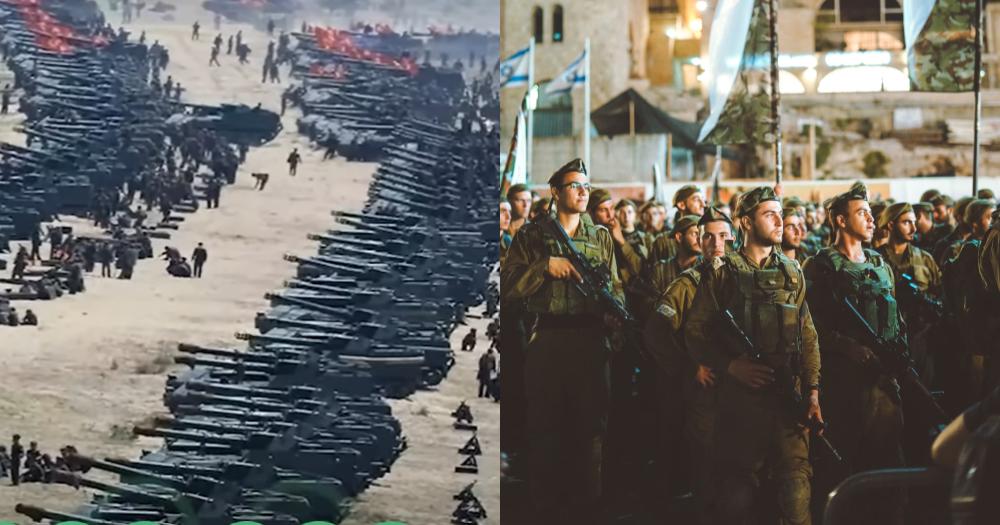"Israel-Iran: What Next?" was how former Permanent Secretary of the Ministry of Foreign Affairs Bilahari Kausikan began a Facebook post on Apr. 17.
It is a question pondered by many.
Observers have described Israel and Iran's recent attacks on each other as significant escalations in an already perilous, multilateral conflict.
And although Iran's strike was almost completely tactically unsuccessful, Israel has vowed to retaliate, even as it continues to launch attacks against Hamas in Gaza and Hezbollah in Lebanon.
But observers, including Bilahari, have warned that retaliation will likely worsen and expand the ongoing regional conflict, even though it is necessary for deterrence.
Conflict between Iran and Israel
Conflict between Israel and Iran is nothing new.
Since the revolution of 1979, the government of Iran has been foes with Israel.
However, moves against each other have largely been relatively constrained, mostly relying on proxies and falling short of open, direct kinetic warfare, as Bloomberg describes.
Therefore, the airstrike on the Iranian consulate in Damascus, Syria on April 2, 2024 was seen as a more provocative move than usual.
Bloomberg elaborated that during the Syrian civil war, Iran built up a military presence in Syria, to support Syria's President Bashar Al-Assad and Hezbollah, the militant group in Lebanon on Israel's northern border.
"In an effort to stop the arms flow and counter this second hostile presence on its northern border, Israel for years has carried out strikes inside Syria against arms shipments and other targets it says are linked to Iran and its allies, in some cases killing Iranians, according to media accounts."
Iran blamed Israel for the attack, which killed seven Iranian military personnel, including two senior generals from the Iran Revolutionary Guard Corps (IRGC).
It vowed a "serious response".
Israel did not claim responsibility for the attack, although an Israeli military spokesperson told CNN that it was a "military building disguised" as a diplomatic one.
Iran's retaliatory missile and drone attack on Israel on Apr. 13, 2024 was the first direct strike by Iran on Israeli territory from Iranian soil.
Response needed for deterrence
In his post, Bilahari said that the Israeli defence policy revolves around deterrence.
This means using military strength to disincentivise neighbouring countries from attacking.
Deterrence also entails sending the message that Israel cannot be cowed or deterred.
Bilahari noted that Iran's attack was a failure, with almost all missiles and drones intercepted.
However, Iran has "boasted" that the attack changed the strategic equation with Israel.
"That is no idle boast. And precisely because the strategic equation has changed, Israel must respond," Bilahari said.
This means that Israel has to respond to restore deterrence against Iran and demonstrate to its proxies and the entire Middle East, both friend and foe, that Israel will do what it deems necessary to protect its security, he added.
To that end, Bilahari said that Israel's response "cannot be only symbolic" and "has to cause real pain".
However, this will risk a wider conflict that neither side wants.
And although Iran emphasised that it considered the matter "closed for now", Bilahari asserted that "Tehran (Iran's capital) must know it is impossible for Israel not to respond", citing his earlier on the importance of deterrence.
What happens next?
Although American and British fighter jets were instrumental in shooting down the Iranian drones and missiles last week, U.S. President Joe Biden emphasised that the U.S. will not support or assist any retaliation by Israel against Iran.
Bilahari said that he "does not think Israel will respond immediately", pointing out that "the uncertainty over when, how and where is an asset".
Bilahari added that the Israeli retaliation need not be "fully kinetic", pointing to Israel’s "formidable cyber capabilities".
But he cautioned that the attack would probably not solely employ cyber assets.
If (or when) Israel does attack Iran again, it is certain to prompt an Iranian response.
Writing for Al Jazeera, Daoud Kuttab predicted that a regional Iranian-Israeli conflict will likely involve the Gulf countries, the US, Russia, and China, creating a "potentially explosive global confrontation".
No good options, but possible for wider conflict to be avoided
Bilahari said there are "no good options for either Israel or Iran", but described the situation as "par for the course for the Middle East, the region of cruel dilemmas".
To escape a wider conflict would require "fine judgements" from both sides, but Bilahari did not see that as impossible, describing both Israel and Iran as "sophisticated and rational actors".
Concluding his post, he said the situation in the Middle East was "precarious but not hopeless - yet".
You can see the post in full below:
Related stories:
Top photo via Military Weapons YouTube and Unsplash
If you like what you read, follow us on Facebook, Instagram, Twitter and Telegram to get the latest updates.



